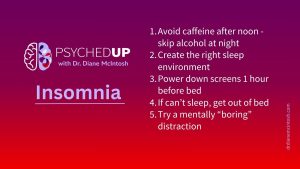
Struggling With Sleep? Here Are My Top Five Tips for Better Rest
I want to share my top five “sleep hygiene” habits that can support healthier sleep. They won’t solve chronic insomnia on their own, but they are essential ingredients for better rest.

Doing the work to maintain our mental health can sometimes feel too challenging as we try to balance the demands of everyday life – whether related to work, family, or an unforeseen furnace issue.
Living a healthy lifestyle, through physical activity, eating healthily and maintaining our social lives, can feel like an added burden.
However, those aspects of our lives are critically important for both our physical and our mental health. That’s because they all play a role in reducing inflammation.
When stress is severe and chronic, an inflammatory cycle can develop in the brain. Ultimately, that inflammation can cause changes in how the brain is structured and how it functions. This increases our risk for physical illness, as well.
This post will cover how a good gut = healthier brain.
There are several steps we can take to boost our immune system, but one we seldom think of is actually critically important: maintaining a healthy gut microbiome.
The bacteria that make up our gut microbiome are the unsung heroes of mental health.
In fact, these healthy bacteria, which live inside the gut, play a crucial role in both physical and brain health.
You can take charge of your own gut biome, so your heroic gut bacteria can do their best work.
Good gut = healthier brain. Here are some simple tips for feeding your gut bacteria, and turning it into a superhero in your health journey:
Working towards a healthier lifestyle has impacts beyond just one person. Healthier lifestyles support a healthier society, reducing the load on our health care system and improving workplaces by reducing absenteeism and long-term disability.
If you’re wondering about how to change your approach to eating and other lifestyle choices, there are many excellent websites, including UnlockFood.ca by the Dieticians of Canada or your provincial health information website, such as HealthLinkBC.
If you have employee benefits, they may cover a consultation with a nutritionist or personal trainer.
Finding an accountability partner, someone who wants to make similar changes, can help you to keep on track, as you help them to do the same.
Most importantly, Rome wasn’t built in a day.
Taking small steps, especially earlier on your journey, might mean you’re more likely to stick with your plan. You’ll be making a long-term investment that can pay real dividends for your mental and physical health.
This blog post is part of a series looking at the state of our mental healthcare system and ways we can create sustainable change to improve quality and outcomes for anyone impacted by mental illness.

I want to share my top five “sleep hygiene” habits that can support healthier sleep. They won’t solve chronic insomnia on their own, but they are essential ingredients for better rest.

There’s something about flipping the page on the calendar from December to January. For many of us, the beginning of a new year represents a clean slate. So, if you find yourself in the mood to take that time to pause and reflect after the holidays, here are a few tips on making smart New Year’s resolutions.

The holidays can be stressful. Here are a few thoughts on how to make the most of what can be a most wonderful time of the year.
Please provide your contact information in the form below. It helps if you provide enough detail in your message so we can help. We look forward to hearing from you!
Thank you for your message. We will respond to your email promptly.